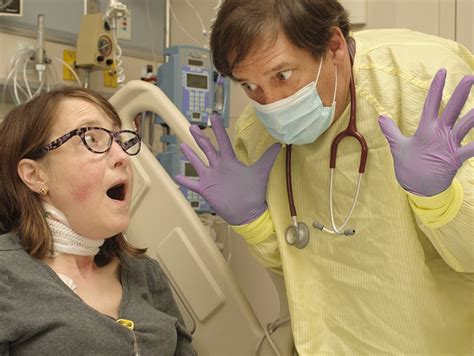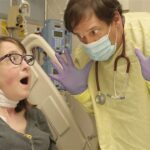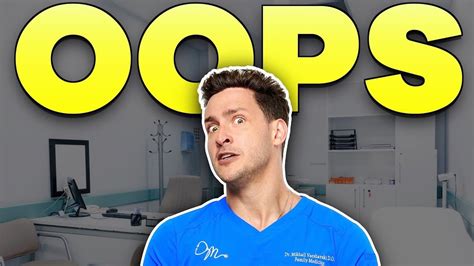
Doctors, nurses, and EMTs reveal some of their most bizarre and memorable patient encounters, ranging from the humorous to the outright unbelievable, highlighting the unpredictable nature of healthcare and the challenges faced by medical professionals on a daily basis.
Healthcare professionals, the unsung heroes often navigating the delicate balance between life and death, encounter a spectrum of human experiences that extend far beyond the textbooks. In a candid reveal, doctors, nurses, and EMTs have shared some of their most unforgettable patient encounters, offering a glimpse into the often surreal world behind hospital doors and ambulance bays. These stories, ranging from the amusing to the alarming, underscore the unpredictable nature of their profession and the extraordinary resilience of the human spirit.
The Unbelievable Objects and Unexpected Explanations
One recurring theme in these shared experiences is the astonishing array of foreign objects patients manage to insert into themselves. A doctor recounted the tale of a patient who arrived complaining of abdominal pain, only to reveal a collection of cutlery discovered during an X-ray. “He said he was practicing to be a magician,” the doctor stated, highlighting the lengths to which some individuals will go to concoct an explanation. Similarly, a nurse described the removal of a toy car from a patient’s rectum, with the patient offering the less-than-convincing explanation that he “fell on it.” These anecdotes, while humorous on the surface, serve as a stark reminder of the diverse and often perplexing challenges medical professionals face.
The prevalence of foreign objects in unexpected places underscores the need for healthcare providers to approach each case with a blend of professionalism and open-mindedness. As one EMT noted, “You learn to never judge. You’ve seen it all, and even when you think you have, someone will surprise you.” This sentiment reflects the importance of providing non-judgmental care, regardless of the circumstances, and prioritizing the patient’s well-being above all else.
The Case of Mistaken Identity and Bizarre Behaviors
Beyond the realm of foreign objects, medical professionals also shared stories of mistaken identity and bizarre behaviors that left them scratching their heads. One nurse recounted the experience of being mistaken for a pizza delivery person by a disoriented patient, who proceeded to demand his order. Another described a patient who insisted on communicating solely through interpretive dance, making it challenging to ascertain the nature of his ailment.
These anecdotes, while amusing in retrospect, highlight the importance of clear communication and adaptability in healthcare settings. Medical professionals must be able to effectively communicate with patients from diverse backgrounds and with varying cognitive abilities, adapting their approach to meet the individual needs of each patient. The ability to remain calm and composed in the face of unusual behavior is also crucial, as it allows providers to maintain control of the situation and ensure the safety of both the patient and themselves.
The Shocking Reveals and Unexplained Phenomena
Some of the most memorable patient encounters involved shocking reveals and unexplained phenomena that defied logical explanation. A doctor recounted the story of a patient who claimed to have been abducted by aliens and subjected to medical experimentation. While skeptical, the doctor admitted to finding unusual scars on the patient’s body that could not be easily explained. Similarly, a nurse described the experience of witnessing a patient seemingly levitate off the bed during a seizure, an event that left her shaken and questioning her understanding of reality.
These encounters, while rare, serve as a reminder of the limitations of medical science and the mysteries that still surround the human body and mind. While healthcare professionals are trained to rely on evidence-based practices, they must also remain open to the possibility of the unexplained and acknowledge the limits of their knowledge. In such cases, empathy and compassion are paramount, as patients may be experiencing genuine distress, regardless of the perceived validity of their claims.
The Impact on Healthcare Professionals
These extraordinary patient encounters take a toll on healthcare professionals. The emotional burden of witnessing suffering, coupled with the stress of managing unpredictable situations, can lead to burnout, compassion fatigue, and even post-traumatic stress disorder. It is essential for healthcare organizations to provide adequate support systems for their staff, including counseling services, stress management programs, and opportunities for peer support.
The importance of self-care cannot be overstated. Medical professionals must prioritize their own well-being to effectively care for others. This includes maintaining a healthy work-life balance, engaging in regular exercise, practicing mindfulness, and seeking support when needed. By prioritizing their own health and well-being, healthcare professionals can better cope with the challenges of their profession and continue to provide high-quality care to their patients.
The Underlying Themes and Lessons Learned
Beyond the individual anecdotes, these shared experiences reveal several underlying themes about the nature of healthcare and the human condition. One recurring theme is the importance of empathy and compassion. Regardless of the circumstances, healthcare professionals must approach each patient with a genuine desire to help and alleviate suffering. This requires active listening, non-judgmental communication, and a willingness to understand the patient’s perspective.
Another key theme is the importance of adaptability and resilience. The healthcare environment is constantly changing, and medical professionals must be able to adapt to new challenges and unexpected situations. This requires critical thinking skills, problem-solving abilities, and a willingness to learn from their mistakes. Resilience is also essential, as healthcare professionals must be able to bounce back from setbacks and maintain their focus in the face of adversity.
Finally, these stories underscore the importance of teamwork and collaboration. Healthcare is a team effort, and medical professionals must be able to work effectively with colleagues from diverse backgrounds and disciplines. This requires clear communication, mutual respect, and a shared commitment to providing the best possible care for the patient.
The collective experiences shared by these doctors, nurses, and EMTs serve as a powerful reminder of the challenges and rewards of working in healthcare. They offer a glimpse into the often-unseen world of medical professionals, highlighting their dedication, compassion, and resilience in the face of adversity. While the stories may be humorous, shocking, or even disturbing, they ultimately underscore the profound impact that healthcare professionals have on the lives of their patients and the importance of supporting these unsung heroes.
Examples of the Encounters (from the source)
-
The Accidental Ingestion: An ER doctor recounted a patient who swallowed a key, mistaking it for medication in the dark. The retrieval process involved X-rays and a specialist, ending with the successful removal of the key without surgery.
-
The Unforeseen Object: One nurse told the tale of a patient who came to the ER with stomach pains and was found to have a fork, spoon, and knife in their abdomen. The patient claimed to be practicing a magic trick.
-
The Pizza Mix-Up: A healthcare worker shared a story of an elderly patient who mistook them for a pizza delivery person, demanding their order despite being in a hospital bed.
-
The Interpretive Dancer: A nurse told of a patient who could only communicate through interpretive dance, making it extremely challenging to diagnose the issue.
-
The Alien Abduction: One medical professional spoke of a patient who claimed to have been abducted by aliens and showed what they believed to be scars from the abduction.
These stories, while unique, highlight the range of unusual occurrences that healthcare workers may encounter.
Further Elaboration on the Challenges Faced
The medical field is not just about treating illnesses; it involves handling a diverse range of human behaviors and circumstances. One of the most significant challenges is maintaining professionalism in the face of bizarre situations. Healthcare professionals are trained to handle medical emergencies, but they also must navigate sensitive and potentially humorous scenarios with grace and empathy.
The need to remain calm and collected in high-stress environments is critical. An EMT responding to a call might encounter a chaotic scene with multiple injuries, requiring quick thinking and decisive action. In such situations, the ability to compartmentalize emotions and focus on the task at hand is vital. This is further complicated by the emotional toll that these experiences can take, leading to burnout and compassion fatigue if not properly managed.
Communication barriers also present significant challenges. Patients may have cognitive impairments, language barriers, or be under the influence of substances, making it difficult to gather accurate information. Healthcare providers must use a variety of techniques to overcome these obstacles, including using interpreters, employing non-verbal communication, and involving family members when appropriate.
Ethical dilemmas are another common challenge. Decisions about patient care often involve complex ethical considerations, such as end-of-life care, informed consent, and resource allocation. Healthcare professionals must navigate these dilemmas while upholding the principles of patient autonomy, beneficence, non-maleficence, and justice.
The stories shared by these doctors, nurses, and EMTs also highlight the importance of interdisciplinary collaboration. Effective patient care requires teamwork among various healthcare professionals, including physicians, nurses, pharmacists, therapists, and social workers. Each member of the team brings unique skills and perspectives, and effective communication and coordination are essential for achieving optimal patient outcomes.
The Role of Technology in Modern Healthcare
Technology plays an increasingly important role in modern healthcare, transforming the way medical professionals diagnose, treat, and manage patients. Electronic health records (EHRs) have streamlined the process of documenting and accessing patient information, improving efficiency and reducing the risk of errors. Telemedicine has expanded access to care for patients in rural or underserved areas, allowing them to consult with specialists remotely.
Advanced imaging technologies, such as MRI and CT scans, provide detailed views of the human body, enabling earlier and more accurate diagnoses. Robotic surgery allows surgeons to perform complex procedures with greater precision and less invasiveness. Artificial intelligence (AI) is being used to analyze medical images, predict patient outcomes, and personalize treatment plans.
However, technology also presents new challenges for healthcare professionals. The increasing reliance on EHRs can lead to information overload and alert fatigue. Telemedicine requires providers to adapt their communication skills and build rapport with patients remotely. The use of AI in healthcare raises ethical concerns about bias, privacy, and accountability.
Healthcare organizations must invest in training and support to ensure that their staff can effectively use these new technologies. They also need to address the ethical and legal issues associated with their implementation. By embracing technology responsibly, healthcare professionals can improve patient care and enhance their own efficiency and effectiveness.
The Future of Healthcare
The healthcare landscape is constantly evolving, driven by advances in technology, changes in demographics, and shifts in healthcare policy. The future of healthcare will likely be characterized by a greater emphasis on prevention, personalized medicine, and patient engagement.
Preventive care will become increasingly important as healthcare systems strive to reduce the burden of chronic diseases. This will involve promoting healthy lifestyles, screening for risk factors, and providing vaccinations. Personalized medicine will tailor treatment plans to the individual characteristics of each patient, taking into account their genetic makeup, lifestyle, and environmental exposures.
Patient engagement will empower patients to take an active role in their own care. This will involve providing them with access to their medical records, educating them about their conditions and treatment options, and involving them in decision-making. Telehealth and remote monitoring technologies will enable patients to manage their health from the comfort of their own homes.
The future of healthcare will also be shaped by the growing demand for healthcare services, driven by an aging population and an increase in chronic diseases. Healthcare systems will need to find innovative ways to deliver high-quality, affordable care to a growing number of patients. This will require a greater focus on efficiency, collaboration, and technology.
The stories shared by these doctors, nurses, and EMTs provide a glimpse into the human side of healthcare, reminding us that behind every medical condition is a person with unique experiences, challenges, and needs. As healthcare continues to evolve, it is essential to maintain a focus on compassion, empathy, and patient-centered care.
Frequently Asked Questions (FAQ)
-
What are some of the most common unusual items doctors find inside patients?
According to accounts from healthcare professionals, common unusual items include cutlery (forks, spoons, knives), toys (like toy cars), and other everyday objects that patients often try to explain away with creative excuses. One doctor mentions a patient with cutlery, “He said he was practicing to be a magician,” while others involve objects patients claimed they “fell on.”
-
How do healthcare professionals deal with patients who have cognitive or mental health issues that make communication difficult?
Healthcare providers employ a variety of strategies such as using interpreters for language barriers, relying on non-verbal communication, and involving family members to gather necessary information. Adaptability and patience are key, as is being able to maintain a calm and non-judgmental approach. One nurse described adapting to a patient who “insisted on communicating solely through interpretive dance.”
-
What are the main challenges faced by healthcare professionals in their day-to-day work?
Challenges include maintaining professionalism in bizarre situations, dealing with communication barriers due to cognitive issues or language differences, navigating ethical dilemmas (such as end-of-life care), and managing the emotional toll of witnessing suffering. They must also remain adaptable and resilient to cope with unpredictable and high-stress environments.
-
How does technology impact the experiences of healthcare workers, both positively and negatively?
Technology, such as electronic health records (EHRs) and telemedicine, improves efficiency and expands access to care. However, it can also lead to information overload, alert fatigue, and requires adapting communication skills for remote consultations. There are also ethical concerns related to the use of AI in healthcare.
-
What kind of support systems are available for healthcare professionals to cope with the stress and emotional toll of their jobs?
Healthcare organizations often provide counseling services, stress management programs, and opportunities for peer support. Self-care practices such as maintaining a healthy work-life balance, engaging in regular exercise, and practicing mindfulness are also crucial for managing stress and preventing burnout.
-
How do medical professionals balance skepticism with the need to provide compassionate care, especially when patients present unusual or seemingly unbelievable claims?
Healthcare professionals balance skepticism with compassion by approaching each patient with empathy and a genuine desire to help, regardless of how unbelievable their claims may seem. While they rely on evidence-based practices, they also remain open to the possibility of the unexplained and acknowledge the limits of their knowledge. The priority is always the patient’s well-being, and providing non-judgmental care is essential.
-
Can you give an example of how a seemingly humorous patient encounter can actually reveal a deeper medical or psychological issue?
A seemingly humorous encounter, such as a patient claiming to have “fallen” on an object, can reveal underlying medical or psychological issues like substance abuse, self-harm, or cognitive impairment. Healthcare professionals are trained to look beyond the surface and investigate the root cause of the issue, providing appropriate medical and psychological support.
-
What steps can healthcare organizations take to better prepare their staff for handling unusual and challenging patient encounters?
Healthcare organizations can provide training on de-escalation techniques, communication skills, and cultural sensitivity. They can also offer simulations and role-playing exercises to help staff practice handling unusual situations. Additionally, providing access to mental health resources and promoting a supportive work environment can help staff cope with the emotional toll of their jobs.
-
In what ways does the role of an EMT differ from that of a doctor or nurse in handling these types of patient encounters?
EMTs are often the first responders at the scene of an emergency, requiring them to quickly assess the situation and provide immediate medical care. They may encounter chaotic and dangerous environments, and must be able to make decisions under pressure. Doctors and nurses, on the other hand, typically have more time to assess patients and develop treatment plans in a controlled environment. However, all three roles require strong communication skills, empathy, and the ability to adapt to unexpected situations.
-
What are some of the ethical considerations that arise when dealing with patients who have unusual beliefs or practices that conflict with conventional medical wisdom?
Ethical considerations include respecting patient autonomy, even when their beliefs differ from medical recommendations. Healthcare professionals must provide patients with accurate information about their condition and treatment options, and allow them to make informed decisions about their care. However, they also have a responsibility to ensure that patients are not harmed by their choices, and may need to intervene if a patient’s decisions pose a significant risk to their health or safety.









